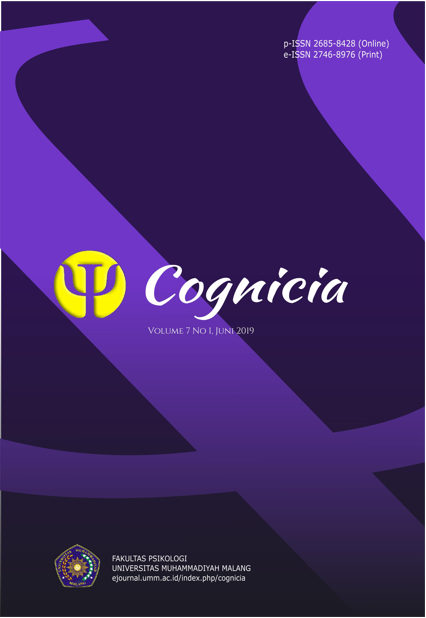Hubungan antara kecenderungan internet addiction dengan empati pada anak sekolah dasar
DOI:
https://doi.org/10.22219/cognicia.v7i1.8145Abstract
Empathy in children is considered very important because it will affect their social and individual skills. One of the factors that influence the empathy is communication through the internet. The tendency of internet addiction is the use of the internet which is aimed of accessing social media, playing online games, listening to music and videos online excessively. The purpose of this study is to determine the relationship between the tendency of internet addiction and empathy in elementary school children. This study used a correlational qualitative approach. The subjects were 115 students with a range of grades 4 to 6 taken by purposive sampling technique. The method of data analysis was the product moment correlation method from Karl Pearson of utilizing the SPSS 21.0 program. The results showed that (r) mark was 0.206 with p was 0.014 <0.05. It indicated that there is a significant negative relationship between the tendency of internet addiction and the empathy. The contribution of internet addiction to the empathy was 4,2% (r2= 0.042).
Downloads
Downloads
Published
How to Cite
Issue
Section
License
Copyright (c) 2019 Galuh Mawarani

This work is licensed under a Creative Commons Attribution-ShareAlike 4.0 International License.
Authors who publish with Jurnal Cognicia agree to the following terms:
- For all articles published in Jurnal Cognicia, copyright is retained by the authors. Authors give permission to the publisher to announce the work with conditions. When the manuscript is accepted for publication, the authors agree to automatic transfer of the publishing right to the publisher.
- Authors retain copyright and grant the journal right of first publication with the work simultaneously licensed under a Creative Commons Attribution-ShareAlike 4.0 International License that allows others to share the work with an acknowledgment of the work's authorship and initial publication in this journal.
- Authors are able to enter into separate, additional contractual arrangements for the non-exclusive distribution of the journal's published version of the work (e.g., post it to an institutional repository or publish it in a book), with an acknowledgment of its initial publication in this journal.
- Authors are permitted and encouraged to post their work online (e.g., in institutional repositories or on their website) prior to and during the submission process, as it can lead to productive exchanges, as well as earlier and greater citation of published wor (See The Effect of Open Access).

This work is licensed under a Creative Commons Attribution-ShareAlike 4.0 International License







